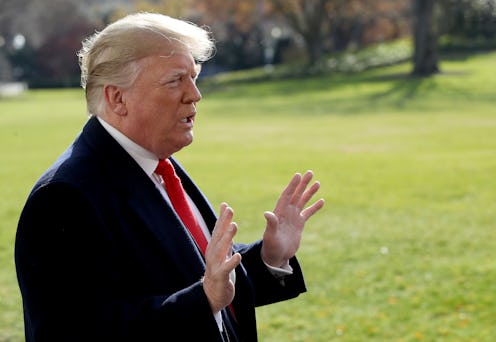News
A New Study Suggests That Men With "Fragile Masculinity" Are Drawn To Trump

In a report for The Washington Post, two psychologists found that President Donald Trump appeals to men with fragile masculinity — or men who are insecure about their manhood. New York University social psychologist Eric Knowles and doctoral student Sarah DiMuccio analyzed Google Trends and spoke to a sample of 300 men as part of their research, and they determined that Trump appears to attract male supporters who want to reaffirm their manliness.
To start their research, Knowles and DiMuccio used the following Google search topics to assess levels of fragile masculinity around the country: “erectile dysfunction,” “hair loss,” “how to get girls,” “penis enlargement,” “penis size,” “steroids,” “testosterone” and “Viagra.” They expected these search terms to be common among men who were insecure about their manhood, and asked 300 men on Amazon’s Mechanical Turk crowdsourcing platform if they were likely to search for these topics.
The two psychologists then compared the search results in different parts of the country to regions where Trump performed well during the 2016 presidential election. They found that Trump had accumulated greater support in regions where more people had Googled the above search topics. Knowles and DiMuccio uncovered a similar phenomenon during the 2018 midterm elections; their research indicated that Republican candidates were more popular in districts where these search terms were more common.
Knowles and DiMuccio did acknowledge that their research was based on correlation, and therefore did not guarantee that fragile masculinity led more voters to vote for Trump.
"We can’t be entirely sure that fragile masculinity is causing people to vote in a certain way," the psychologists wrote. "However, given that experimental work has identified a causal connection between masculinity concerns and political beliefs, we think the correlations we’ve identified are important."
The researchers also noted that the correlation between fragile masculinity and support for a conservative candidate was much stronger in 2016 than it had been in 2008 or 2012. Support for John McCain in 2008, for example, or for Mitt Romney in 2012, was not strongly associated with fragile masculinity. This led Knowles and DiMuccio to conclude that "Trump’s re-engineering of the GOP as a party inextricably tied to many Americans’ identity concerns — whether based on race, religion or gender — will ensure that fragile masculinity remains a force in politics."
The 2018 midterm elections made something else clear, per Knowles and DiMuccio — that fragile masculinity does not result in less support for female candidates, but rather in increased support for Republican candidates of any gender. A record number of women ran for elected office this year, but the majority of them were Democrats.
These Democratic women capitalized on mobilization against the Trump administration, and drew significant support across the country, but in the more than 390 House races that pitted a Democrat against a Republican, Republican candidates were more successful in districts with greater rates of fragile masculinity, per Google Trends.
Ever since Trump first launched his presidential campaign back in 2015, he has made numerous comments asserting his own masculinity. However, Knowles and DiMuccio remarked that many men who support Trump are not confident in their masculinity, as Trump claims to be, but instead quite insecure.